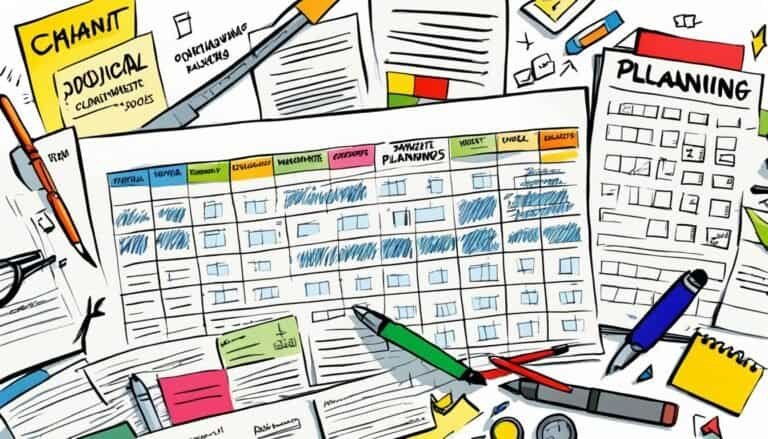What Is Critical Thinking?
Picture yourself exploring through a dense forest without a compass or map – that's where critical thinking comes in.
But what exactly is critical thinking beyond just a buzzword?
Let's delve into how this essential skill can sharpen your decision-making abilities, enhance problem-solving strategies, and ultimately lead you to make more informed choices in both your personal and professional life.
Key Takeaways
- Critical thinking involves disciplined evaluation of information for logical reasoning.
- It enhances problem-solving, decision-making, and analytical skills.
- Open-mindedness and reflective thinking are key components of critical thinking.
- Application of critical thinking fosters innovation, strategic advantage, and continuous learning.
Definition of Critical Thinking
To truly grasp the essence of critical thinking, one must understand it as a disciplined process of actively and skillfully conceptualizing, applying, analyzing, synthesizing, and evaluating information gathered from observation, experience, reflection, reasoning, or communication.
Analytical reasoning lies at the core of critical thinking, enabling individuals to break down complex problems into manageable parts and systematically assess each element. Through logical evaluation, critical thinkers assess the validity of arguments, the soundness of evidence, and the coherence of ideas presented to them.
Engaging in analytical reasoning involves the ability to identify logical fallacies, inconsistencies, and biases that may distort our understanding of a situation. This process requires individuals to question assumptions, consider alternative perspectives, and draw well-founded conclusions based on evidence. Logical evaluation, on the other hand, demands a systematic approach to examining information, weighing its relevance and reliability, and forming judgments that are grounded in reason rather than emotion or preconception.
The foundation of critical thinking rests upon the pillars of analytical reasoning and logical evaluation, empowering individuals to navigate complex issues with clarity and precision.
Importance of Critical Thinking
Moving from understanding the disciplined process of critical thinking, it becomes evident that the ability to think critically holds significant importance in various aspects of life. Problem-solving and decision-making are fundamental skills that are enhanced through critical thinking. By analyzing situations, evaluating information, and considering different perspectives, you can make well-informed decisions and solve complex problems effectively.
Additionally, critical thinking sharpens your analytical and reasoning abilities. It enables you to dissect information, identify patterns, and draw logical conclusions. This skill is invaluable in academic settings, professional environments, and everyday life. Being able to think critically allows you to navigate challenges with a strategic mindset, approach tasks with clarity, and adapt to changing circumstances with agility.
Furthermore, critical thinking fosters innovation and creativity. By questioning assumptions, exploring alternative solutions, and challenging existing beliefs, you can push boundaries and generate new ideas. In a world driven by innovation, the ability to think critically is a competitive advantage that can set you apart in various fields.
Components of Critical Thinking
Enhancing your critical thinking skills involves honing specific components that contribute to your ability to analyze, evaluate, and draw logical conclusions effectively. To strengthen your reasoning skills and analytical thinking, contemplate the following key components:
- Evidence Evaluation: Practice appraising the quality and relevance of evidence to support your arguments effectively.
- Problem-Solving Abilities: Enhance your capacity to identify, analyze, and solve complex problems through systematic approaches.
- Open-Mindedness: Cultivate a willingness to contemplate various perspectives and revise your opinions based on new information.
- Decision-Making Skills: Develop the ability to make sound decisions by weighing different options and anticipating potential outcomes.
- Effective Communication: Sharpen your communication skills to articulate your thoughts clearly and persuasively, fostering constructive dialogue.
Benefits of Critical Thinking
Strengthening your critical thinking skills not only enhances your ability to analyze and evaluate information but also brings about numerous benefits in various aspects of your life. Developing strong analytical skills through critical thinking allows you to dissect complex problems more effectively and make informed decisions. Additionally, mastering problem-solving techniques empowers you to navigate challenges with ease and efficiency. The table below highlights some key benefits of honing your critical thinking skills:
| Benefits of Critical Thinking | |
|---|---|
| Enhanced Analytical Skills | Critical thinking sharpens your ability to interpret data, identify patterns, and draw meaningful conclusions. |
| Improved Decision Making | By critically analyzing situations, you can make well-thought-out decisions that lead to more favorable outcomes. |
| Effective Problem Solving | Critical thinking equips you with the tools to approach problems systematically and develop innovative solutions. |
| Better Communication | Enhanced critical thinking enables you to articulate your thoughts clearly, listen attentively, and engage in constructive dialogues. |
| Lifelong Learning | Cultivating critical thinking fosters a thirst for knowledge, encouraging continuous learning and personal growth. |
How to Develop Critical Thinking
To cultivate critical thinking skills effectively, it's essential to engage in regular practice and exposure to diverse perspectives and challenging scenarios. Developing critical thinking involves honing problem-solving skills and enhancing analytical reasoning abilities.
Here are five key strategies to help you strengthen your critical thinking capabilities:
- Practice Reflective Thinking: Take time to analyze your thoughts and decisions, reflecting on your reasoning processes.
- Engage in Debates and Discussions: Participate in conversations that challenge your viewpoints, encouraging you to think critically about different perspectives.
- Read Widely: Explore various sources of information, including those that may contradict your beliefs, to broaden your understanding.
- Solve Puzzles and Riddles: Engaging in puzzles can help sharpen your problem-solving skills and enhance your logical thinking abilities.
- Seek Feedback: Encourage feedback on your thought processes from peers or mentors to gain insights into areas for improvement and further development.
Conclusion
So, now you know the importance of critical thinking in today's fast-paced world.
Did you know that according to a study by the World Economic Forum, critical thinking is one of the top skills needed for success in the workplace by 2025?
By developing your critical thinking skills, you can enhance your decision-making abilities, problem-solving skills, and overall cognitive flexibility.
Keep challenging yourself to think critically and watch your success soar!







